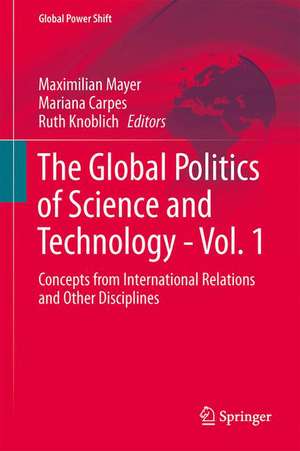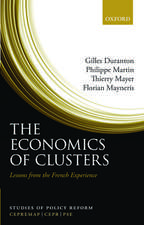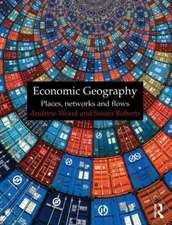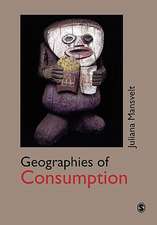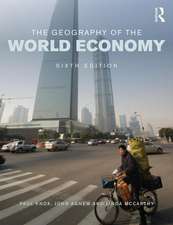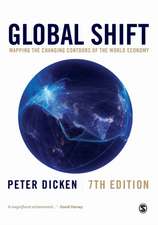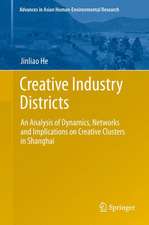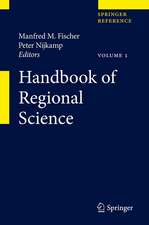The Global Politics of Science and Technology - Vol. 1: Concepts from International Relations and Other Disciplines: Global Power Shift
Editat de Maximilian Mayer, Mariana Carpes, Ruth Knoblichen Limba Engleză Hardback – 3 sep 2014
This first volume summarizes various time-tested approaches for studying the global politics of science and technology from an IR perspective. It also provides empirical, theoretical, and conceptual interventions from geography, history, innovation studies, and science and technology studies that indicate ways to enhance and rearticulate IR approaches. In addition, several interviews advance possibilities of multi-disciplinary collaboration.
| Toate formatele și edițiile | Preț | Express |
|---|---|---|
| Paperback (1) | 999.14 lei 6-8 săpt. | |
| Springer Berlin, Heidelberg – 23 aug 2016 | 999.14 lei 6-8 săpt. | |
| Hardback (1) | 1005.11 lei 6-8 săpt. | |
| Springer Berlin, Heidelberg – 3 sep 2014 | 1005.11 lei 6-8 săpt. |
Din seria Global Power Shift
-
 Preț: 357.43 lei
Preț: 357.43 lei - 15%
 Preț: 642.51 lei
Preț: 642.51 lei - 20%
 Preț: 557.45 lei
Preț: 557.45 lei - 20%
 Preț: 569.00 lei
Preț: 569.00 lei - 15%
 Preț: 644.30 lei
Preț: 644.30 lei - 15%
 Preț: 640.71 lei
Preț: 640.71 lei - 18%
 Preț: 1114.96 lei
Preț: 1114.96 lei - 15%
 Preț: 645.60 lei
Preț: 645.60 lei - 15%
 Preț: 705.34 lei
Preț: 705.34 lei - 18%
 Preț: 1126.35 lei
Preț: 1126.35 lei - 18%
 Preț: 2088.15 lei
Preț: 2088.15 lei - 15%
 Preț: 702.54 lei
Preț: 702.54 lei - 15%
 Preț: 646.11 lei
Preț: 646.11 lei - 15%
 Preț: 698.47 lei
Preț: 698.47 lei - 18%
 Preț: 896.21 lei
Preț: 896.21 lei - 15%
 Preț: 698.62 lei
Preț: 698.62 lei - 18%
 Preț: 779.89 lei
Preț: 779.89 lei - 15%
 Preț: 691.76 lei
Preț: 691.76 lei - 15%
 Preț: 699.59 lei
Preț: 699.59 lei - 15%
 Preț: 692.24 lei
Preț: 692.24 lei - 18%
 Preț: 721.51 lei
Preț: 721.51 lei - 18%
 Preț: 729.84 lei
Preț: 729.84 lei -
 Preț: 381.98 lei
Preț: 381.98 lei - 18%
 Preț: 779.39 lei
Preț: 779.39 lei - 18%
 Preț: 783.98 lei
Preț: 783.98 lei - 18%
 Preț: 733.46 lei
Preț: 733.46 lei -
 Preț: 455.12 lei
Preț: 455.12 lei - 9%
 Preț: 789.75 lei
Preț: 789.75 lei
Preț: 1005.11 lei
Preț vechi: 1225.75 lei
-18% Nou
Puncte Express: 1508
Preț estimativ în valută:
192.35€ • 199.68$ • 160.39£
192.35€ • 199.68$ • 160.39£
Carte tipărită la comandă
Livrare economică 22 martie-05 aprilie
Preluare comenzi: 021 569.72.76
Specificații
ISBN-13: 9783642550065
ISBN-10: 3642550061
Pagini: 295
Ilustrații: XIII, 282 p. 7 illus., 5 illus. in color.
Dimensiuni: 155 x 235 x 22 mm
Greutate: 0.59 kg
Ediția:2014
Editura: Springer Berlin, Heidelberg
Colecția Springer
Seria Global Power Shift
Locul publicării:Berlin, Heidelberg, Germany
ISBN-10: 3642550061
Pagini: 295
Ilustrații: XIII, 282 p. 7 illus., 5 illus. in color.
Dimensiuni: 155 x 235 x 22 mm
Greutate: 0.59 kg
Ediția:2014
Editura: Springer Berlin, Heidelberg
Colecția Springer
Seria Global Power Shift
Locul publicării:Berlin, Heidelberg, Germany
Public țintă
ResearchCuprins
The Global Politics of Science and Technology: An Introduction.- Part I: Approaches and Debates About Sciences and Technologies Within IR.- Part II: Interventions from STS, History Innovation Studies and Geography.- Part III: Interlude: Exploring and Multi-Disciplinary Field.
Notă biografică
Maximilian Mayer is program co-chair of STAIR (Science, Technology, Arts and International Relations) a newly established section of the International Studies Association. He studied in Bochum and Shanghai and holds a master degree in East Asian politics from the Ruhr-University Bochum. He received scholarships from the German National Academic Foundation twice from 2004 to 2007 and from 2009 to 2010. He joined the CGS in October 2009 and has worked there as managing assistant (2009-2013). He leads the CGS research group on “rising knowledge powers” and presents regularly at international conferences. His research interests include the global politics/policy of science, innovation, and technology; Chinese foreign, and energy policy; global energy and environmental politics; International Relation theories.
Mariana Carpes is a junior research fellow and a Ph.D. candidate at the GIGA German Institute of Global and Area Studies where she is working on a historical comparative analysis of the nuclear strategies of Brazil, India, and South Africa. Her main areas of interest are history and theory of IR, nuclear politics, and foreign policy analysis. Recently Mariana has also started to work on strategic partnership between EU and Brazil. In 2012 and 2013 she held presentations on this topic at the European External Action Service (EEAS). She holds a Bachelor in History from the Universidade Federal Fluminense (Brazil) and a Master in International Relations from the Pontificia Universidade Catolica do Rio de Janeiro.
Ruth Knoblich is a research fellow at the Institute of Development Research and Development Policy (IEE), Ruhr-University Bochum and at the Institute of Political Science and Sociology, University of Bonn; she teaches courses in both institutes and at the South African – German Centre for Development Research, University of the Western Cape. She studied in Bonn and Madrid and holdsa master’s degree in Political Science, History and Philosophy from the University of Bonn as well as two basic degrees in Medicine. Her research interests include innovation policies and innovation systems, emerging economies and South-South science and technology cooperation, global politics of intellectual property rights, science and technology in the international political economy, and national policy making in the context of globalisation and global governance.
Mariana Carpes is a junior research fellow and a Ph.D. candidate at the GIGA German Institute of Global and Area Studies where she is working on a historical comparative analysis of the nuclear strategies of Brazil, India, and South Africa. Her main areas of interest are history and theory of IR, nuclear politics, and foreign policy analysis. Recently Mariana has also started to work on strategic partnership between EU and Brazil. In 2012 and 2013 she held presentations on this topic at the European External Action Service (EEAS). She holds a Bachelor in History from the Universidade Federal Fluminense (Brazil) and a Master in International Relations from the Pontificia Universidade Catolica do Rio de Janeiro.
Ruth Knoblich is a research fellow at the Institute of Development Research and Development Policy (IEE), Ruhr-University Bochum and at the Institute of Political Science and Sociology, University of Bonn; she teaches courses in both institutes and at the South African – German Centre for Development Research, University of the Western Cape. She studied in Bonn and Madrid and holdsa master’s degree in Political Science, History and Philosophy from the University of Bonn as well as two basic degrees in Medicine. Her research interests include innovation policies and innovation systems, emerging economies and South-South science and technology cooperation, global politics of intellectual property rights, science and technology in the international political economy, and national policy making in the context of globalisation and global governance.
Textul de pe ultima copertă
An increasing number of scholars have begun to see science and technology as relevant issues in International Relations (IR), acknowledging the impact of material elements, technical instruments, and scientific practices on international security, statehood, and global governance. This two-volume collection brings the debate about science and technology to the center of International Relations. It shows how integrating science and technology translates into novel analytical frameworks, conceptual approaches and empirical puzzles, and thereby offers a state-of-the-art review of various methodological and theoretical ways in which sciences and technologies matter for the study of international affairs and world politics. The authors not only offer a set of practical examples of research frameworks for experts and students alike, but also propose a conceptual space for interdisciplinary learning in order to improve our understanding of the global politics of science and technology.
This first volume summarizes various time-tested approaches for studying the global politics of science and technology from an IR perspective. It also provides empirical, theoretical, and conceptual interventions from geography, history, innovation studies, and science and technology studies that indicate ways to enhance and rearticulate IR approaches. In addition, several interviews advance possibilities of multi-disciplinary collaboration.
This first volume summarizes various time-tested approaches for studying the global politics of science and technology from an IR perspective. It also provides empirical, theoretical, and conceptual interventions from geography, history, innovation studies, and science and technology studies that indicate ways to enhance and rearticulate IR approaches. In addition, several interviews advance possibilities of multi-disciplinary collaboration.
Caracteristici
First handbook for the discipline of IR concerning science and technology Features well-known scholars from various disciplines Presents interviews about the core themes of the book Offers a methodological toolbox for experts and students Includes supplementary material: sn.pub/extras
